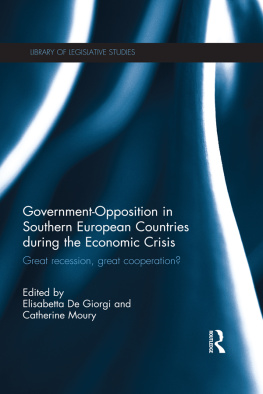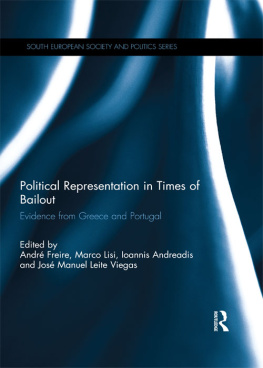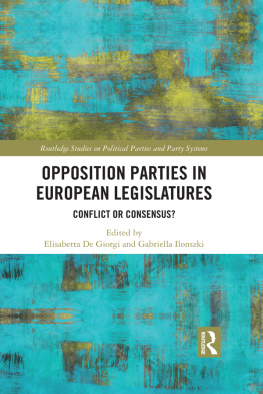The Exceptional Case of Post-Bailout Portugal
This book explores the argument that Portugal has been an exception to the trend of political upheaval and electoral instability across Southern Europe following the financial crisis and the bailout period. It does so by mapping and exploring in-depth three key dimensions: the governmental arena, the party system and citizens political attitudes.
The five chapters in this edited volume show that a number of factors combine to make Portugal not only a very stimulating case study, but also an exception within the South European panorama: the stability of its party system, and that of the mainstream parties electoral support in particular; the quick recovery of political attitudes after the end of the bailout period (20112014); the absence of competitive populist challengers until 2019, despite high levels of populist attitudes amongst the citizenry; the successful and stable union between anti-austerity parties supporting the socialist government (dubbed the Contraption) and its adoption of an austerity by stealth model. This book shows that it is possible to combine critical junctures and political stability, responsiveness and responsibility, through the study of one of the most intriguing cases in Southern Europe in the last few decades. The Exceptional Case of Post-Bailout Portugal will be of interest to students, researchers and scholars of Political Science and European Studies.
The chapters in this book were originally published as a special issue of the journal, South European Society and Politics.
Elisabetta De Giorgi is Assistant Professor at the Department of Political and Social Sciences (DiSPeS) of the University of Trieste, Italy. Her main research interests are parliaments from a comparative perspective and opposition parties. She has published several articles in national and international journals and the book Lopposizione parlamentare in Italia. Dallantiberlusconismo allantipolitica (2016). She has edited the volume Opposition Parties in European Legislatures. Conflict or Consensus? (2018) with Gabriella Ilonszki.
Jos Santana-Pereira is Assistant Professor at ISCTE-Lisbon University Institutes Department of Political Science and Public Policy, and Researcher at CIES-Lisbon University Institute, Portugal. His research focuses on issues such as media systems, media effects on public opinion, campaigns, political attitudes and voting behaviour. His work has been published in journals including Electoral Studies, Journal of European Public Policy, Perspectives on European Politics and Society, South European Society and Politics, Swiss Political Science Review and International Journal of Press/Politics.
South European Society and Politics Series
Series editors
Susannah Verney, University of Athens, Greece
Anna Bosco, University of Trieste, Italy
The parallel regime transitions of the 1970s, when Southern Europe was the vanguard of the third wave of democratisation, the impact of EU membership and Europeanisation and more recently, the regions central role in the eurozone crisis have all made Southern Europe a distinctive area of interest for social science scholars. The South European Society and Politics book series promotes new empirical research into the domestic politics and society of South European states. The series, open to a broad range of social science approaches, offers comparative thematic volumes covering the region as a whole and on occasion, innovative single-country studies. Its geographical scope includes both old and new Southern Europe, defined as Italy, Greece, Portugal, Spain, Cyprus, Malta and Turkey.
The 2014 European Parliament Elections in Southern Europe
Still Second Order or Critical Contests?
Edited by Hermann Schmitt and Eftichia Teperoglou
Is Turkey De-Europeanising?
Encounters with Europe in a Candidate Country
Edited by Alper Kaliber and Senem Aydin-Dzgit
Crisis Elections, New Contenders and Government Formation
Breaking the Mould in Southern Europe
Edited by Susannah Verney and Anna Bosco
Italy Transformed
Politics, Society and Institutions at the End of the Great Recession
Edited by Martin Bull and Gianfranco Pasquino
The AKP Since Gezi Park
Moving to Regime Change in Turkey
Edited by Susannah Verney, Anna Bosco and Senem Aydin-Dzgit
The Exceptional Case of Post-Bailout Portugal
Edited by Elisabetta De Giorgi and Jos Santana-Pereira
For a full list of titles please visit https://www.routledge.com/South-European-Societyand-Politics/book-series/SESP
First published 2022
by Routledge
2 Park Square, Milton Park, Abingdon, Oxon, OX14 4RN
and by Routledge
605 Third Avenue, New York, NY 10158
Routledge is an imprint of the Taylor & Francis Group, an informa business
2022 Taylor & Francis
All rights reserved. No part of this book may be reprinted or reproduced or utilised in any form or by any electronic, mechanical, or other means, now known or hereafter invented, including photocopying and recording, or in any information storage or retrieval system, without permission in writing from the publishers.
Trademark notice: Product or corporate names may be trademarks or registered trademarks, and are used only for identification and explanation without intent to infringe.
British Library Cataloguing-in-Publication Data
A catalogue record for this book is available from the British Library
ISBN13: 978-1-032-10620-5 (hbk)
ISBN13: 978-1-032-10621-2 (pbk)
ISBN13: 978-1-003-21625-4 (ebk)
DOI: 10.4324/9781003216254
Typeset in Myriad Pro
by codeMantra
Publishers Note
The publisher accepts responsibility for any inconsistencies that may have arisen during the conversion of this book from journal articles to book chapters, namely the inclusion of journal terminology.
Disclaimer
Every effort has been made to contact copyright holders for their permission to reprint material in this book. The publishers would be grateful to hear from any copyright holder who is not here acknowledged and will undertake to rectify any errors or omissions in future editions of this book.
Elisabetta De Giorgi

and Jos Santana-Pereira

ABSTRACT
The analysis explores government, party system and political attitudes as dimensions revealing Portugals exceptionalism during its post-bailout period (201519) vis--vis three other South European countries, Greece, Italy and Spain. It shows that government stability was greater in Portugal, no party system revolution took place and political trust recovered more quickly than in the other countries. In contrast, Portugal is not dissimilar from the other cases regarding the prevalence of populist attitudes, even though populist actors did not achieve electoral success before 2019. The article includes an update on political attitudes and government-opposition relations during the covid-19 pandemic and introduces the other articles in this collection.
The political landscape across Southern Europe has changed remarkably in recent years. Amidst the shockwaves created by the Great Recession, South European countries first went through a phase of electoral epidemic (Bosco & Verney 2012) as a consequence of economic recession, popular protest, and a steady erosion of support for governing parties. This was followed by a phase of government epidemic (Bosco & Verney 2016), with longer processes of government formation, new parties joining government coalitions and, in some cases, the need to repeat elections. In a nutshell, the last decade has allowed us to witness South European governments being ousted from power, critical elections questioning the structure of (more or less) consolidated party systems, and new challengers making their triumphal entrance onto the political and parliamentary stage (Hobolt & Tilley 2016; Vidal 2018).
 and Jos Santana-Pereira
and Jos Santana-Pereira 









